interview
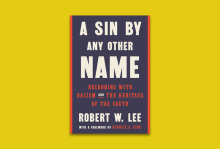
Da’Shawn Mosley: What inspired this book?
Robert W. Lee IV: I’m a pastor first. But the events in Charlottesville, and our nation’s response, terrified me and inspired me to put pen to paper and say, “We gotta talk about this, because if we don’t, our silence becomes complicity.”
This summer marks the second anniversary of the white supremacy violence in Charlottesville. What is your read of where we are as a nation? Charlottesville will live in our collective history as an event of great horror. It was domestic terrorism. As we move forward, especially in the 2020 election, we’re going to have to talk about the deep chasm of racism that exists in our country without using it as a pandering mechanism to get votes. It’s important for us to care and be deeply concerned about these issues.
As a white man, how have you navigated wanting to be an ally and not be at the forefront of the movement while at the same time being catapulted into the public spotlight? It’s a learning experience. I hate to put it like that, but it is.
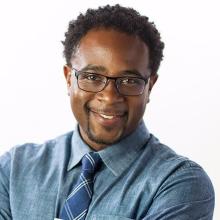
White evangelical support for Donald Trump has led some black evangelicals to a crisis of faith and ecclesial identification. In this moment, Jemar Tisby has risen as a voice that’s unafraid to challenge white evangelicals’ complicity with racism, forging another path for those feeling alienated. Tisby is currently completing his PhD in history at the University of Mississippi. He is the president of The Witness: A Black Christian Collective, previously known as the Reformed African American Network, and writes widely about racism, the American church, and social justice. In 2017, a New York Times article quoted him saying: “Racism is not a ‘blind spot’ within white evangelicalism. It is part of that tradition’s DNA.” Now, Tisby has published a book tracing that DNA by way of history.

Dome Karukoski’s Tolkien, out in theaters this Friday, focuses on another story of friendship, that of the Tea Club and Barrovian Society (TCBS) which Tolkien was a part of during his education at King Edward’s School in Birmingham. The film tells the story of Tolkien’s early life as an orphan living in poverty and at the mercy of his benefactors, and the love and friendship he finds in spite of it. Tolkien is gorgeously shot and filmed with warmth, humor, and friendship.
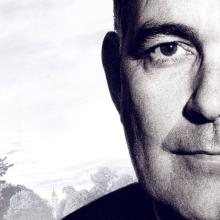
The new documentary Hesburgh, which premieres nationwide on Friday, May 3, and is directed by the Emmy-nominated filmmaker Patrick Creadon (Wordplay, I.O.U.S.A.) gives us a thorough look at Father Hesburgh’s walk. From Hesburgh’s origins to his decision to devote his life to the priesthood, to his appointment — at the young age of 35 — as president of the University of Notre Dame, to all the personal, national, and global adversities that the man of the cloth later faced afterward, Hesburgh weaves a beautiful and engaging story of faith lived out.

Morgan Freeman’s dulcet tones make him one of the most recognizable voices on the planet. He has used his presence to become one of the most famous actors of his generation, during which time he won the Academy Award for Million Dollar Baby, was nominated four more times, and has also picked up Golden Globe and Screen Actors Guild gongs. In recent years, Freeman has been focused on the documentary series The Story Of God With Morgan Freeman.

If you knew that your life here on earth would be short, how would you live it? Would you try to control every aspect of it to avoid the suffering and pain you knew was coming? Would you become angry, embittered, and push people away? Or would you try to make the most of it? These questions are at the heart of Five Feet Apart, starring Cole Sprouse and Haley Lu Richardson as two kids with cystic fibrosis (CF) who fall in love. The film is actor (Jane the Virgin) and filmmaker ( My Last Days) Justin Baldoni’s feature film debut.
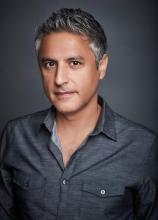
So far, Aslan’s cable shows — including his Muslim-American family sitcom that was dropped by ABC — have not panned out. But his ambitions to reach a broader audience remain as large as ever. And unlike the somewhat braggadocios and didactic style of commentary that he’s become known for in front of television cameras, he’s eager to change minds while occupying a different place: behind the camera.
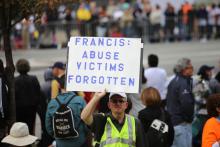
Over the past few decades, sexual abuse survivors, whistleblowers, and journalists have exposed a horrific pattern of sex abuse and cover up in the Roman Catholic Church. As a Catholic millennial, I have never known a church unmarked by the abuse crisis. In the bathrooms at my Catholic high school and my small Midwestern parish, I distinctly remember posters detailing who I should call if I was abused or assaulted by an authority figure. Last year, the Pennsylvania grand jury report and Cardinal Theodore McCarrick revelations made my generation aware of this crisis in a renewed way. Too often, in responses, the voices of survivors themselves are too often lost.
I recently had the opportunity to discuss the current state of the Roman Catholic Church’s sexual abuse crisis with Tim Lennon, a survivor of clergy sexual abuse. Lennon is the president of the board of directors of the Survivors Network of those Abused by Priests (SNAP), a nonprofit support network for survivors of sexual abuse by religious and institutional authorities.
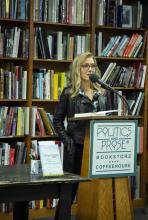
Heartland: A Memoir of Working Hard and Being Broke in the Riches Country on Earth is a gripping account traversing family, poverty, geography, history, and public policy. It’s already been longlisted for a National Book Award and is a Kirkus Prize finalist. Smarsh captures the experience of poverty in the deftest of prose: “I knew how to compare prices on tags before I knew how to read words.”

Camp Manna is the story about Ian, a young orphaned boy who doesn’t believe in Jesus. He is sent to Camp Manna, a Christian camp led by Jack “Cujo” Parrish (Gary Busey). Once there, he’s placed in a cabin of misfits and forced to participate in the God Games, a camp-wide competition. Antics invariably ensue.

I’m inspired and troubled by the stories I have heard.
In the blue light of evening all boundaries get blurred.
And I believe in something better, and that love’s the final word,
And that there’s still something whole and sacred in the world.
—“Help in Hard Times,” by Carrie Newcomer
CARRIE NEWCOMER IS a Quaker singer-songwriter whose music is inspired by hope and the great human potential for peaceful coexistence. The Beautiful Not Yet is the title of both her newest album (Available Light Records) and an accompanying book of poems, essays, and lyrics. She is also working on a spoken word and music collaboration with Parker J. Palmer (author of Let Your Life Speak and Healing the Heart of Democracy) called “What We Need Is Here: Hope, Hard Times, and Human Possibility,” which is scheduled to premiere in spring 2017.
Newcomer lives in southern Indiana when she’s not traveling the world singing her folk and gospel-infused tunes and engaging social and environmental justice issues.
She was interviewed for Sojourners by John Malkin, a musician, journalist, and radio host in Santa Cruz, Calif., whose books include Sounds of Freedom: Musicians on Spirituality and Social Change and The Only Alternative: Christian Nonviolent Peacemakers in America.
John Malkin: When did you start making music?
Carrie Newcomer: I picked up a guitar when I was in my early teens and learned my first three chords and started writing songs. I’ve always loved the combination of language and music.
In the liner notes of The Beautiful Not Yet, you mention that many of these songs were written on trains and planes. How has travel been a part of your life and music?

LAST SUMMER, THE FUTURE of for-profit prisons seemed bleak. The U.S. Department of Justice announced it would begin phasing out its use of privately run prisons and the U.S. Department of Homeland Security quickly followed suit, declaring that it would reconsider its use of privately run detention centers. Stocks for companies that ran for-profit prisons plunged.
But then Donald Trump was elected president, and private prison stocks immediately soared. The nation’s largest prison company, CoreCivic (formerly Corrections Corporation of America), reported a boost of more than 40 percent in the value of its shares. Given Trump’s promises to “create a new special deportation task force,” investors bet that privately run detention centers will play a key role.
And the investors may be right. Every year, DHS detains about 400,000 undocumented immigrants in 250 centers nationwide, and 62 percent of the beds in these centers are operated by for-profit corporations.
According to Maria-José Soerens, a licensed mental-health counselor serving undocumented immigrants in Seattle, there are two major problems with for-profit detention centers. First, for-profit centers are not held accountable to the standards that govern federally run centers. In her work in these centers, Soerens has heard complaints ranging from a lack of medical attention to inadequate opportunities for parent-child visitation; one young woman who was having suicidal thoughts was kept in solitary confinement until she told guards she was “better.”
But the deepest problem, explains Soerens, is that most detention centers only exist because corporations saw a “business opportunity.” Beginning in the early 2000s, for-profit prison companies successfully lobbied Congress to expand drastically the number of beds in the immigration detention system—a move that doubled the revenue of the two largest for-profit prison companies. In 1998, there were 14,000 beds available for immigrant detention; today, there are 34,000.
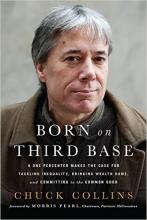
WRITER AND ACTIVIST Chuck Collins, the great-grandson of meatpacker Oscar Mayer, gave up his inheritance when he was 26 and has spent the subsequent decades working to address economic inequality and environmental issues. Via email with Sojourners senior associate editor Julie Polter, he discussed his newest book, Born on Third Base: A One Percenter Makes the Case for Tackling Inequality, Bringing Wealth Home, and Committing to the Common Good (Chelsea Green)—and why organizing and building community across economic lines is good for everyone.
Sojourners: What is your main message in this book?
Chuck Collins: I want to invite wealthy and affluent people to “come home”—to return from wandering in the desert of wealth and privilege, the disconnection from community and place. It means putting a personal stake in reversing the deepening ruts of extreme wealth inequality and the ecological crisis. If we read the signs of the times, we understand this is both in our selfish interest as well as strengthening the common good. These inequalities and ecological challenges are undermining the quality of life for everyone, including wealthy people. There is no wealth on a degraded planet.
By reconnecting with people and places, we come out of exile. Racial and economic advantage is a “disconnection drug”—distancing us from both the suffering and the joy of being a human.
Many of the ultra-wealthy are “placeless” and “stateless”—literally holding multiple passports with money globalized in offshore financial centers around the world. So “coming home” means bringing the wealth home too—taking it out of the offshore tax havens, out of the global financial casino (“going off the Wall Street grid,” as one of the people I interview in Born on Third Base says), and out of the fossil fuel industry.

JUDITH CASSELBERRY'S ORIGINAL LOVE WAS MUSIC. She has been a guitarist and vocalist her entire adult life, including a 1980 to 1994 stint as part of the duo Casselberry-DuPreé. She now performs with Toshi Reagon and BIGLovely. She has shared the stage with Sweet Honey in the Rock, Odetta, Stevie Wonder, Etta James, and Elvis Costello, among others.
Along the way, while still performing, Casselberry earned her bachelor’s degree (in music production and engineering) and then, a few years later, a master’s in ethnomusicology, during which she discovered a passion for teaching. So she went to Yale, earning a doctorate in African-American studies and anthropology in 2008. She is an associate professor of Africana studies at Bowdoin College in Brunswick, Maine, teaching courses on African-American women’s religious lives, music and spirituality in popular culture, music and social movements, and issues in black intellectual thought.
Casselberry’s forthcoming book, The Labor of Faith: Gender and Power in Black Apostolic Pentecostalism (Duke University Press), employs feminist labor theories to examine the spiritual, material, social, and organizational work of women in a New York-based Pentecostal denomination, Church of Our Lord Jesus Christ of the Apostolic Faith (COOLJC). In the course of her research, Casselberry immersed herself for more than two years in the life of True Deliverance Church in Queens, N.Y. She spoke by phone with Sojourners senior associate editor Julie Polter in late January.
Sojourners: You examine the “religious work” of women—including prayer, teaching, care for the sick and grieving, liturgical music and movement, and guiding converts. Why did you choose this framework?

I just met with the three children of Martin Luther King Jr. on a number of occasions over a two-year period and eventually they decided themselves to resolve their differences, which had existed only in court with lawsuits against each other.

People have often said to me, “If Paul came back today, what would he be most shocked at in today’s church?” And I say, unhesitatingly, our disunity — not just the fact that we’re not united, but the fact that we don’t care.

Olcese: In the creation of the film, did you find yourself sympathizing with one character or the other? Was one character easier to make more sympathetic?
Hamm: No. I couldn’t. I absolutely wanted to make the film balanced and fair to both sides. That was completely essential. Don’t forget, both these figures were not liked in Europe before they became statesmen. They were both radical. McGuinness was an ex-member of the IRA, Paisley was a firebrand preacher on the right. These were two men who were pretty much despised universally outside of their own base. It’s like The Odd Couple in the back of a car. I think what the humanity of that is when you take all that away, when you remove from the politician the artifice, and you get a chance to look at them as people, and I think that’s what happens in the movie.

The American Civil Liberties Union collected more than $11 million and 150,000 new members. The Southern Poverty Law Center’s Twitter account gained 9,000 followers. And the Anti-Defamation League, which fights anti-Semitism and other bigotries, saw donations increase fiftyfold.
In the days since Donald Trump won the presidency, these spikes, in support for groups that defend religious and other minorities, speak to a fear that the president-elect will trample on their rights — or at least empower those who would.

Saunders’ spirit of generosity, cloaked in the dark humor and melancholy of his stories, has made him something of a guru to younger writers. A practicing Buddhist, with a childhood in the Catholic Church, Saunders approaches his essays in particular with a spiritual frankness — comfortable with his own limits, unabashedly willing to admit what confounds him, and ready to tell the truth as faithfully as he can.
In July, he published his months-long attempt to understand Trump supporters and how they came to invest so much in a highly divisive, unconventional candidate. He seems both a natural and a jarringly wrong fit to capture this election season — perhaps the writer best ready to chronicle the already-absurd, and the one most willing to take it seriously. And at this moment in 2016, Saunders may be a kinder national narrator than we deserve.

How are a poisoned water supply in Flint and water shut-offs in Detroit connected? Tommy Airey, co-editor of RadicalDiscipleship.net, talked with Detroit activists Monica Lewis-Patrick and Cecily McClellan to get the story behind the story.
LONG BEFORE water shut-offs and poisoning in Flint, democracy in much of Michigan had been hijacked. By the time a governor-appointed “emergency manager” was foisted on Detroit in spring 2013, every large black-majority city in Michigan—from Flint to Benton Harbor to Highland Park to Saginaw—had been appointed an EM, stripping all powers from elected leadership while possessing the authority to renegotiate or cancel union contracts, hire and fire government employees, and sell, lease, or privatize local assets.
Two years ago, about the same time that Flint’s EM transferred the city’s water source from Detroit’s water system to the highly toxic Flint River, Detroit’s EM ordered the city water and sewerage department to begin shutting off the water of all Detroiters who were two months or more behind on their water bills.
Today, in a city with 40 percent of its population surviving below the poverty line, Detroit water rates are twice the national average, and an estimated 100,000 residents, including many elderly folks and children, have had their water shut off by the city. The measures are forcing many longtime, low-income residents, the majority of them black, to leave the city.
Since 2008, the grassroots organization We the People of Detroit (WPD), led by five African-American women, has been creatively resisting emergency management—first of the school system and then the entire city—with a steady campaign of awareness-raising, canvassing, water delivery and advocacy for shut-off victims, and a comprehensive mapping project soon to be released.
Monica Lewis-Patrick is the charismatic, energetic point guard of the group, fueled by the Holy Ghost and her morning standard: a cup of coffee sweetened with four sugar packets. Lewis-Patrick, who’s a grandmother and the mother of two teenage daughters, lost her bid for city council two years ago by a few hundred votes. A few weeks later, she lost her only son to gun violence.
Cecily McClellan, the quiet, confident, all-business power forward of Team WPD, is a retired city employee and former vice-president of the Association of Professional and Technical Employees.
I spoke with them at WPD headquarters on the third floor of St. Peter’s Episcopal Church—a stone’s throw from a downtown getting a corporate facelift financed by public bonds, subsidies, and tax abatements to draw companies in from the suburbs, while many residents struggle just to survive and keep their homes. —Tommy Airey
Tommy Airey: Let’s get this straight: Are you advocating for free water for low-income Detroiters?
Monica Lewis-Patrick: Free water has never been the ask. Personally, I’m not opposed to free water. I believe that water is a human right, and that everyone should have access to it. But the ask here in Detroit has always been for affordable water.
What are the mayor’s objections to an affordability plan in Detroit?
Lewis-Patrick: Over the last 11 months, water shut-offs have led to more foreclosures and pushing people out of the city. We believe [city officials] do not want to participate in a water-affordability plan because it would allow more people to stay in the city, especially in communities they want cleared out for future development.
Is this a conspiracy?
Lewis-Patrick: Conspiracy, in my mind, isn’t the appropriate term, because a lot of times people marginalize conspiracy as just somebody’s idea or accusation. What I would say is that it has been a collaborative, well-orchestrated system of evil. We know for a fact, through all the political analysis and economic research that has been done, that the city bankruptcy didn’t have to go down. People saw it as an opportunity to be able to divest from the water department, to weaken the water department intentionally.
Flint was actually advised by the governor and his emergency managers to come off of the Detroit Water and Sewerage Department system and then to become a part of another water system called KWA [Karegnondi Water Authority]. Flint was the largest external customer of the Detroit water system. How is it that you are advising us to become financially solvent, while at the same time all your deeds are making us insolvent?